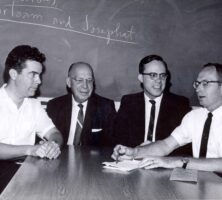A popular debate over whether “God is dead” was occasioned by the so-called radical theology propounded in the 1960s by such theologians as William Hamilton, Gabriel Vahanian, and Paul van Buren. The best known of these proponents was Thomas J. J. Altizer, then a professor of religion at Emory University in Atlanta. The controversy reflected many of the broader cultural and political changes in American society often associated with that decade. “We must realize that the death of God is an historical event, that God has died in our cosmos, in our history, in our [existence],” Altizer claimed. His frequently provocative manner of speaking, which masked a more complex discussion taking place among academic theologians, for a brief time made him a minor celebrity in the popular media.
Although the German philosopher Friedrich Nietzsche had asserted the “death of God” nearly a century earlier and a theological movement had already adopted the phrase to express the perceived incompatibility between a modern worldview and belief in a transcendent deity, the controversy did not fully erupt until 1965. For a decade before this, Altizer wrote, he “had been torn between an interior certainty of the death of God in modern history . . . and a largely mute but nevertheless unshakable conviction of the truth of the Christian faith.”
That others considered these two propositions to be irreconcilable became apparent when Time magazine published two articles on radical theology, the first appearing in October 1965. The second was the cover story for the April 8, 1966, Easter issue, which asked, “Is God Dead?” in large red letters against a plain black background. A flood of correspondence—most of it denouncing Altizer—filled the editorial pages of local and national newspapers, while outraged clergy and alumni threatened to withhold donations from Emory. The College of Bishops of the Southeastern Jurisdiction of the Methodist Church issued a statement critical of his views but did not formally call for his resignation. Sanford Atwood, president of the Methodist-affiliated university, defended Altizer’s tenure in the name of academic freedom, noting also that his appointment was in the undergraduate department of religion and not in the Candler School of Theology, which was responsible for training ministers.

For many observers the controversy and its resolution marked a turning point for Emory, from its previous position as an obscure, southern church school to its present status as a prestigious research university. Altizer left the school in 1968, and the “death of God” movement lost much of its steam by the end of the decade, but Emory continued to maintain a reputation, especially in the South, for theological liberalism.






